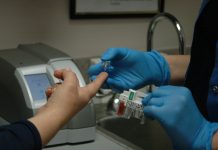
We are updating our information on diet and have the following information on our web page. We would very much appreciate your reviewing this information for accuracy. We would also like to add a link from our site to yours.
Beverages containing alcohol are converted into fat and are high in calories. People with diabetes should drink alcoholic beverages sparingly. If you are a Type I (Insulin dependent) diabetic or Type II (non-insulin dependent) diabetic and taking an oral medication, NEVER DRINK ON AN EMPTY STOMACH. Alcoholic beverages can rapidly lower the blood sugar, causing insulin reactions especially in Type 1. If a person chooses to drink, always drink an alcoholic beverage with food. A glass of wine or beer with a meal can be figured into your daily eating plan. Consult your registered dietitian or doctor for the proper way to include alcoholic beverages in your eating plan.
Thanks for the link. You may also want to link to diabetes. I would suggest adding or editing the following information to what you have.
People with diabetes should only drink alcohol if their diabetes is in good control which means an A1C of less than 6.5. Men should limit their alcohol intake to less than 2 drinks per week, women 1 drink per week. One drink is measured as 12 ounces of beer, 5 ounces of wine or 1 1/2 ounces of distilled liquors. Each alcohol serving contributes around 100 to 160 calories which should be deducted from your calorie total for that day. Avoid sweet liqueurs or mixes like carbonated beverages containing sugar.
The symptoms of hypoglycemia and intoxication are similar (thick tongue speech, shaking, staggering walk, mental confusion etc.). People may confuse these symptoms and ignore or delay treatment of diabetic insulin reactions. I recommend people with diabetes carry or wear something that indicates they have diabetes and the name and dosage of the medication they currently take (insulin or pills).
People with Type II diabetes produce insulin though it may be insufficient or ineffective due to problems with cell insulin receptors. Whereas, people with Type I diabetes do not make any insulin and are dependent on injected insulin.



